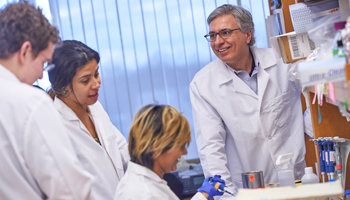HOW CAN WE HELP YOU? Call 1-800-TRY-CHOP
About Rivella Laboratory

The Rivella Lab creates next-generation lentiviral vectors for the cure of hemoglobinopathies including sickle cell disease (SCD). The team are leaders in the discovery of erythroid and iron disorders including beta-thalassemia. The team has made significant contributions to the scientific body of literature regarding red blood cells, and how manipulating the production of red cells can lead to the development of new disease-modifying therapies.
The Rivella Lab is also focused on ineffective erythropoiesis in beta-thalassemia. In patients affected by beta-thalassemia, there is an excessive production of immature erythroid cells. Previous studies suggests erythropoiesis in beta-thalassemia is characterized by enhanced expression of genes that promote cell cycle and survival.
The Rivella Lab works in tandem with the Comprehensive Center for the Cure of Sickle Cell Disease and Other Red Blood Cell Disorders (CuRED), a CHOP-designated Frontier Program that aims to develop and deliver novel gene therapies and stem cell transplants to patients in a family-centered clinic.
Your Gift Can Change Lives
Philanthropic donations power our specialized treatment and breakthrough discoveries. Individual donation like yours will make a difference in the lives of children with sickle cell disease and thalassemia.
Contributors to our work become our partners as we treat the many health needs of people with hemoglobinopathies and continue to research the causes of these complex congenital disorders.
We are incredibly grateful to the following donors who, through their generosity and partnership, have enabled us to strengthen and expand our research:
- Associazione Veneta per la Lotta alla Talassemia (AVLT)
- Devaki and Patrick Jean
Learn more about how you and/or your organization can provide CHOP with vital support by contacting Elena Boroski, annual giving officer, for clinical programs at 267-225-8380 or boroskie@chop.edu.